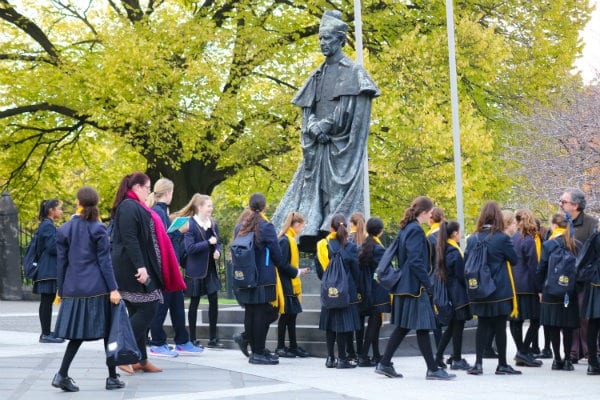So what happens when workforce participation isn’t equal between men and women? What happens when women can only occupy some jobs, or they are not recognised equally with the same pay, and they cannot achieve the same level of leadership as their male counterparts?
The impact is significant and it’s something, as a specialist educator of girls, I am interested in.
The recent Australian Government report, led by David Gonski, outlines a series of recommendations for schools that are aimed at lifting our global educational standing. But this report has a very clear omission: it fails to address how schooling can be used to bring about gender parity in Australia.
In relation to gender equity on a global scale, the World Economic Forum ranked Australia in 2017 in the following areas: Economic Participation and Opportunity (42), Political Empowerment (48), Health and Survival (104), and Educational Attainment (1). Overall, this equates to a gender equity global index rank of (35) for Australia.
You might be interested to know countries that ranked higher than us in relation to gender equity included the expected: New Zealand (9) and Canada (16), but also the unexpected: Nicaragua (6) and Cuba (25).
These rankings establish a stark contrast to the often cited PISA results where Australia was most recently ranked: Science (14), Reading (16), and Mathematics (25). These results indicate that the issue is not so much about education per se, but rather the link between education and social outcomes, particularly in relation to gender.
If you are a girl in Australia, you are more likely to finish Year 12, more likely to go to university, and more likely to achieve higher academic results than boys. So, what then is the problem?
The problem is that schooling success does not translate into life success with regard to issues relating to gender.
A recent study conducted by the University of Queensland Business School found that based on the last ten years, we can expect gender parity in Australia in relation to CEO and Board Chair positions in the year 2221AD. I’m not sure how other people feel about this timeline but I find it quite sobering to think that it will take more than 200 years before Australia achieves gender equity in this area.
So how do we fix this abomination? By making more schooling experiences available for girls in single-sex environments. Many people who haven’t experienced single-sex schooling for girls tend to give the same clichéd response to this suggestion: that it’s not natural, the world is co-ed therefore schools should be co-ed and how will girls learn to talk to boys.
I need to make one thing clear before I continue; no schooling is bad, whether it be government, independent, religion based, co-educational or single-sex – all schooling is good and this should not be reduced to an either-or argument. However, it should be an argument about choice.
Girls’ schools do more than just teach the curriculum and offer a range of sporting and co-curricular opportunities – all schools do that. What girls’ schools do is purposefully develop girls to understand their gender identity and to shape their self-concept, self-efficacy, and self-confidence so girls develop the knowledge and skills required to reject and overcome the gender stereotypes that attempt to define them.
Schooling is so much more than academic outcomes – certainly these open doors, but it is the other skills that young women develop in relation to their belief in themselves that keeps the door open.
If governments were genuine in wanting to improve Australia’s economic position, not to mention educational standing, they would not take away the choice of single-sex schooling.
Currently in Australia there are no government single-sex schools in Queensland, Western Australia or the Northern Territory, with only a small number spread across the other States. And with the majority of single-sex schools being independent, there is no choice for many parents who can’t afford this option.
There are many complex reasons why women do not have equal participation and reward in society, however, all these reasons are linked to social and cultural influences to do with gender. So why not endorse educational environments that not only achieve high academic results, but also deliberately address the social and cultural barriers that keep women from leadership positions and equal participation in the workforce in general?
If governments merely addressed the issue of gender inequity through education, they could potentially add billions of dollars to the Australian economy. If the equity argument isn’t enough surely the money makes an investment in girls worth considering?
Dr Nicole Archard is the Principal of Loreto College Marryatville, SA.


